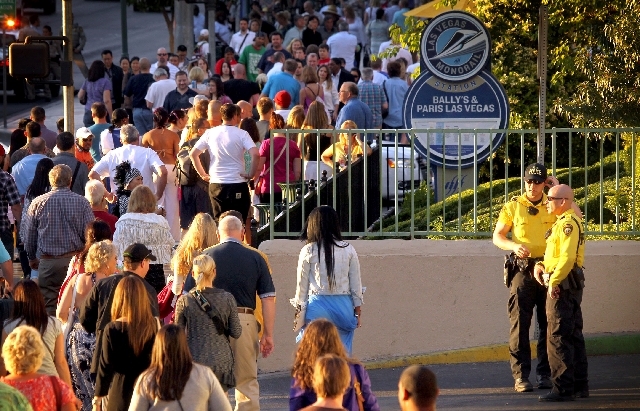Conference attendees discuss Las Vegas as terrorism target

The Boston Marathon bombing was a grim reminder of a fact of life for those who work in counterterrorism, and in Las Vegas:
“Anybody that’s in the business is surprised it’s taken this long to happen,” said Adam Walker, an intelligence analyst with the Southern Nevada Counter-Terrorism Center, said Thursday. “Moving forward, it’s not a question of ‘if,’ it’s a question of ‘when’ something happens on Las Vegas Boulevard.”
Walker’s assessment came during an impromptu panel on the Boston bombing’s effect on tourism held during the 20th Annual International Tourism Safety Conference in Las Vegas.
Panelist Tom Burns, a security and police consultant, agreed that Las Vegas definitely is a target, given the city’s high-profile casino resorts and worldwide reputation.
Juan Pablo Cubides, a Colombian officer, said terrorism most definitely can harm the $44.9 billion Southern Nevada tourism industry, which employs 32 percent of the population.
For 50 years, Colombia experienced terrorism that in turn harmed its tourism industry, Cubides said. It took a decade after the country stabilized for people to again consider it safe to visit, he said.
For one panel member, once-distant memories were brought to the forefront by news of the Boston attack.
Ron Gertner said he could smell the blood and the burning flesh. He could hear screams coming from the wounded and scared, and he saw the smoke rising at the scene.
An Israeli police officer and former Army officer, Gertner remembers these details from the 20 terror attacks he has survived.
“When I saw the Boston attacks … immediately, I got bad memories,” Gertner said.
Gertner said the best defense against terrorism is to engage citizens and teach them from a young age to be aware of suspicious behavior. Things like a freshly shaved beard (notable for the lighter skin exposed) and long sleeves worn on a hot summer day should arouse suspicion, he said.
Conference founder Peter Tarlow said that in this day and age, everyone is responsible for the safety of others.
In Nevada, people are encouraged to report suspicious behavior through the Fusion Center’s website, www.snctc.org, and help officers generate leads.
Gertner explained some key differences in strategies employed by the United States and Israel.
In Israel, you can’t leave packages or items such as suitcases unattended. All hotels have guarded entries, as required by law, and few people would go into a hotel that lacks guards checking the door, he said.
“This is something weird for me that you can move freely between the hotels,” Gertner said of everyday life on the Strip. “After one attack, you will have guards.”
His logic is unassailable because after the Sept. 11, 2001, attacks, hotel security went up drastically with guards checking patrons’ car trunks and visitors being asked why they were coming to the properties. That heightened security slowly relaxed over the years. Now only a few properties have guards posted at the entrances to parking garages. And at those few garages, the guards merely wave visitors by.
Also, during public events, Gertner said no one is allowed on rooftops in Israel except for police officers.
“Another thing you cannot do here is profiling. In Israel we do profiling,” Gertner said.
With that, the audience erupted in cheers.
Contact reporter Laura Carroll at lcarroll@reviewjournal.com or 702-380-4588. Follow @lscvegas on Twitter.












